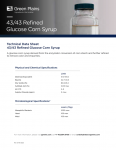Sucrose vs. artificial sweeteners: examining energy intake & expenditure

Owing to a lack of data on appetite, energy intake and energy expenditure among individuals who regularly supplement their diets with sugary (or artificially sweetened) food and drink, researchers revisited previous data on sucrose and artificial sweetener supplementation among overweight people.
They sought to compare the effects of sucrose on energy intake, energy expenditure and appetite sensation on overweight subjects who participated in 10-week supplementation of either sucrose or artificial sweeteners.
For the original study (published in 2002), supplements of sucrose-sweetened beverages and foods (2 grams per kilogram of body weight) or similar amounts containing artificial sweeteners (e.g., stevia, aspartame) were given single-blind to 42 subjects in a 10-week parallel design. About 80% of the supplements by weight were beverages (soft drinks and fruit juices), 20% were from solid foods (e.g. ice cream, marmalade, yogurt). The rest of the diet was free choice.
In the substudy, 24 healthy overweight subjects from the main study were tested in respiratory chambers on two different days—one before the intervention and the second on the last day of the intervention. The subjects were given the same kinds of supplements as the main study. Because many of the sweetener products were lower in calories, researchers compensated with additional butter and corn oil.
Of the 22 subjects who completed the study (12 in the sucrose group, 10 in the artificial sweeteners group), the sucrose group had a higher overall energy intake than the sweetener group, with a resulting between-group difference of 3.26 MJ. Despite this, there was a stronger trend for sucrose group subjects to have a higher appetite between lunch and dinner and after dinner compared to the sweetener group. Nearly 3.5 MJ of the higher energy intake in the sucrose group came from the supplements; indeed, 70% of the sucrose in the supplements came from sucrose-sweetened beverages.
“Already in the 1990s, it was hypothesized that liquid calories fail to trigger appetite regulation; at present several studies support this,” the authors wrote.
Body weight increased in the sucrose group and decreased in the artificial sweetener group during the 10-week intervention. BMR increased in the sucrose group, but no difference in 24-hour energy expenditure was found between the two groups in week 10.
The increase in BMR “was probably caused by the very high EI in the sucrose group during the chamber stay in week 10,” the researchers wrote. “Thus, the changes in body weight in the two groups during the 10-week intervention seemed to be a result of changes in EI rather than of changes in EE.”
Source: American Journal of Clinical Nutrition
DOI: 10.3945/ajcn.113.081554
“Sucrose compared with artificial sweetener: a clinical intervention study of effects on energy intake, appetite, and energy expenditure after 10 wk of supplementation in overweight subjects”
Authors: Lone B Sorenson, Tatjana H Vasilaras, Arne Astrup and Anne Raben


















